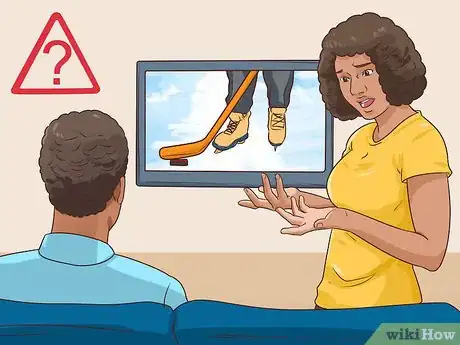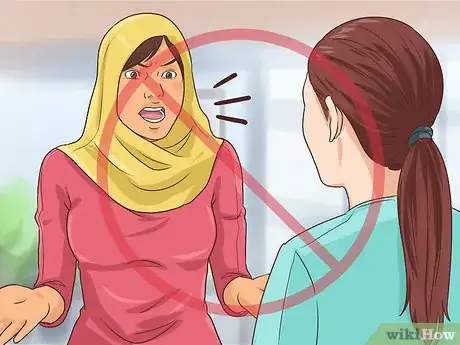This article was co-authored by Klare Heston, LCSW. Klare Heston is a Licensed Independent Clinical Social Worker based in Cleveland, Ohio. With experience in academic counseling and clinical supervision, Klare received her Master of Social Work from the Virginia Commonwealth University in 1983. She also holds a 2-Year Post-Graduate Certificate from the Gestalt Institute of Cleveland, as well as certification in Family Therapy, Supervision, Mediation, and Trauma Recovery and Treatment (EMDR).
There are 14 references cited in this article, which can be found at the bottom of the page.
This article has been viewed 71,425 times.
Everybody wants to feel heard and understood. When it seems like no one is listening to you, it’s easy to feel unimportant, frustrated, and lonely. There are many reasons why you might not feel listened to – maybe your communication style isn’t compatible with other people’s, or maybe you’re unconsciously seeking more attention than the people around you can give. If you feel like your words haven’t been getting through to anyone lately, start by identifying the source of the problem. After that, focus on taking care of your emotional needs and sharpening your communication skills.
Steps
Investigating the Problem
-
1Find the source of your pain. Ask yourself what kind of emotional reaction you have when you don’t feel heard. For instance, you might feel resentful that other people don’t care about your ideas, or you might feel insecure because people don’t seem to approve of you.[1]
- Tracking down the source of your emotional pain will reveal the underlying problem you need to fix. Label it by jotting down what you feel when this happens. Describe what's happening in your body, your thoughts, and your emotional experience.
- For instance, you might note, "When I'm ignored, I feel embarrassed. Like everyone's in on a pact to ignore me. My face becomes flushed and I have a sudden desire to punch or kick something."
-
2Ask yourself whether your expectations are reasonable. Think about how you’re approaching other people and what you’re seeking from them. Ask yourself if you would be able to respond to someone else the way you want others to respond to you.[2]
- Take people’s boundaries into consideration. Other people may have different personal boundaries than you do.
- Let's say you often try to get your husband's attention when he's watching a hockey game. This is notoriously a bad time, and sets you both up for disappointment.
Advertisement -
3Take a look at your communication style. Evaluate your communication skills and your approach to talking to others. People who tend to communicate differently may have problems understanding one another. Spend some time observing what's happening in the environment right before you speak. Also, take note of your general tendencies when it comes to communicating with others.[3]
- For instance, if you speak in a very soft tone of voice, people may not always hear you talking.
- Check to see what you are actually stating. You may be offended that people don't seem concerned about your opinion, yet always decline to share when given a chance .
-
4Think about other reasons people might not be hearing you. Sometimes, communication problems have nothing to do with what you’re saying or how you’re saying it. The person you’re trying to talk to just might not be available to listen right now. Maybe they’re wrapped up in personal problems, or maybe they’re not skilled at empathizing with others.[4]
- Don’t take it personally if someone you know is a bad listener. It doesn’t mean that you aren’t worth listening to. After a few attempts, consider not sharing as much with this individual.
- For example, your best bud might be going through a divorce, and you notice him zoning out when you're talking. His current situation at home could be interfering with his ability to be a good listener.
Communicating More Effectively
-
1Express yourself confidently. People may not listen to you if you talk too quickly, mumble, or apologize for speaking up. Speak in a clear, assertive voice, and make sure you’re loud enough for people to hear you. Don’t repeat yourself after you make your point.[5]
- If you aren’t confident about speaking up, experience is the best way to get more comfortable with it. Practice talking to others in low-stakes situations, such as when you’re with a group of friends.
- Consider joining an organization like Toastmasters to become a more confident speaker.
-
2Lead into your topic. Get the other person’s attention by letting them know you want to talk about something important. Say something like, “I need to discuss something with you. Do you have a minute?”[6]
-
3Be concise. If you tend to ramble or tell long stories, people might stop paying attention to you, or they might not know what point you’re trying to make. Keep it short when you’ve got something important to communicate.[7]
- Planning what you want to say before you say it can help you avoid rambling.
-
4Avoid lashing out at the other person. If you are upset or angry, be careful not to take your feelings out on the other person. They probably won’t hear anything you have to say if they feel like you’re attacking them. Express yourself calmly, and avoid calling names or making accusations.[8]
- Use “I” statements instead of “you” statements to keep the conversation calm and civil.
- For example, say, “I feel like I don’t matter to you when you when you don't listen to what I have to say,” instead of, “You obviously don’t care about me.”
-
5Practice active listening. When you listen actively to someone, they’ll be more likely to do the same for you. Focus on what the person is saying, instead of just planning your own reply as they talk. Practice mirroring to make sure you understand what they’re thinking and feeling.[9]
- Mirroring means restating someone’s point in your own words. One example of a mirroring phrase is, “It sounds like you feel hurt because I didn’t come to see you last week. Is that right?”
Coping with Negative Emotions
-
1Value yourself. Know your worth, and remind yourself of your good qualities. Don’t let yourself feel unworthy of care and attention just because some people haven’t been listening to you.[10]
- Avoid talking negatively to yourself. Get into the habit of using encouraging, positive self-talk instead.
- Maintaining healthy self-esteem will make it easier for you to connect with other people.
-
2Spend time with supportive people. If you have positive relationships in your life, nurture them. Reach out to the people who always listen to you or help you, and limit the time you spend around unsupportive or negative people.[11]
- Make sure to support your friends and family members in return when they need it.
- Spending more time with caring, supportive people may be enough to solve the problem of not feeling heard.
- It may be more difficult if a person who consistently does not listen is someone close to you. Try having a direct conversation with them.
-
3Look for ways you can take care of yourself. Your needs are important, whether other people acknowledge them or not. Don’t neglect yourself. Find small ways to take care of your physical, mental, and emotional health, even if you can’t count on anyone else to help.[12]
- For instance, you could take care of your physical health by remembering to eat breakfast or by deciding to go to bed an hour earlier than usual.
-
4Express yourself creatively. Art can be a therapeutic outlet for emotions that feel like they have nowhere to go. Try drawing, writing stories or poetry, or dancing to let out your feelings.[13]
-
5See a therapist. If you’re struggling to deal with your feelings on your own, talk to a professional. A therapist or counselor will be able to help you cope with the emotions you’re experiencing and come up with a practical plan to communicate better with others.[14]
- Part of the problem might be continuing in a relationship where you are not heard or valued. A therapist can help you assess your current relationships to determine whether or not they are healthy.
References
- ↑ https://psychcentral.com/blog/archives/2011/12/19/seeking-to-be-understood-the-need-for-approval/
- ↑ https://www.psychologytoday.com/blog/making-change/201208/personal-change-realistic-expectations-positive-thinking
- ↑ https://www.fastcompany.com/3042569/7-ways-to-get-through-to-just-about-anyone
- ↑ https://www.scientificamerican.com/article/bring-science-home-speaking-memory/
- ↑ https://www.psychologytoday.com/blog/communication-success/201401/7-keys-establishing-confident-impression
- ↑ https://www.psychologytoday.com/blog/shift-mind/201401/being-heard-breaking-through-the-impasse
- ↑ http://www.oprah.com/money/communication-skills-how-to-make-yourself-heard
- ↑ http://www.huffingtonpost.com/robert-leahy-phd/relationship-communication_b_815699.html
- ↑ https://psychcentral.com/lib/become-a-better-listener-active-listening/
- ↑ http://www.counselling-directory.org.uk/counsellor-articles/5-ways-to-value-yourself
- ↑ http://www.apa.org/helpcenter/emotional-support.aspx
- ↑ http://tinybuddha.com/blog/45-simple-self-care-practices-for-a-healthy-mind-body-and-soul/
- ↑ https://learning.blogs.nytimes.com/2015/03/04/how-do-you-express-your-creativity/comment-page-1/?_r=0
- ↑ https://www.helpguide.org/articles/emotional-health/finding-a-therapist-who-can-help-you-heal.htm







































































